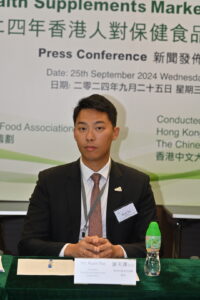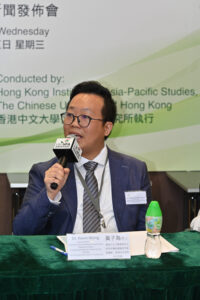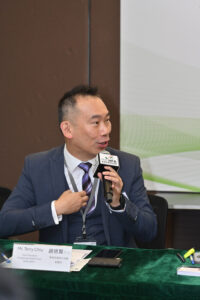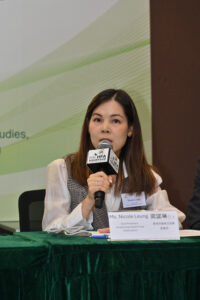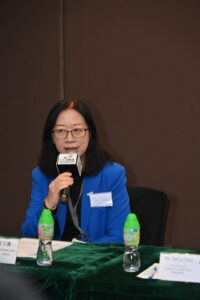
26 Sep Hong Kong Health Food Association announces Survey Findings on “Survey on Health Supplement Market in Hong Kong 2024”
Hong Kong Health Food Association announces Survey Findings on
“Survey on Health Supplement Market in Hong Kong 2024”
The Survey was organized by the Hong Kong Health Food Association, and conducted by The Hong Kong Institute of Asia-Pacific Studies of The Chinese University of Hong Kong. Thanks to the support of The Hon Peter Shiu Ka-Fai, Legislative Councilor (Wholesale & Retail), the Press Conference of the Market Survey was arranged in Legislative Complex on 25th September 2024.
The awareness and demand for health supplements among Hong Kong citizens are steadily increasing. As a representative of the health supplements industry, the Hong Kong Health Supplements Association commissioned The Hong Kong Institute of Asia-Pacific Studies CUHK to conduct a territory-wide telephone survey for Hong Kong residents aged 18 or above. The survey was conducted from May to July 2024, and the number of successful respondents was 1,005. In the 2024 survey, 23.0% of respondents indicated purchasing more health supplements than before the COVID-19 pandemic. It is estimated that over 3.9 million citizens in Hong Kong had taken health supplements in the past 6 months; the projected half-year spending on health supplements of health supplement users of the population is approximately HK$18.5 billion, revealing significant market potential.
Six Important Trends
1. Understanding and uptake of health supplements
The survey indicates that 83.7% of respondents can distinguish between health and non-health supplements. Encouragingly, 62.9% of respondents had taken health supplements in the past six months, with popular choices including “Vitamins or minerals” (56.2%), “Probiotics” (36.8%), and ” Chinese Supplements” (26.8%). This emphasizes the high level of understanding and uptake of diverse health-enhancing products.
2. Changes before and after the COVID-19 epidemic
Notably, 23.0% reported increased health supplement purchases compared to pre-COVID-19 pandemic, and 29.8% indicated a growing emphasis on immune health, reflecting a heightened focus on proactive well-being strategies.
3. Considerations when choosing health supplements
It is estimated that around 4 million citizens had taken health supplements in the past 6 months (approximately 3.939 million), accounting for 62.9% of the adult population. A notable 50.6% of health supplement users integrated these products into their daily routines, underscoring a dedication to maintaining well-being and vitality. Perceived benefits positively influenced decision-making, with 58.5% of respondents prioritizing the advantages offered by health supplements. Other influential factors included the price-performance ratio (35.1%) and recommendations from trusted sources (25.4%), highlighting a discerning yet proactive approach to supplement selection.
4. Current spending on health supplements
On average, health supplement users invested in their well-being, with users of “Chinese Supplements” spending an average of HK$904.54 monthly on “Chinese Supplements” and users of “Western or other health supplements” allocating HK$577.00 monthly on “Western or other health supplements”, average monthly expenditure per health supplement user is HK$781.59. The half-year expenditure estimate of health supplement users of the population (approximately HK$18.5 billion) demonstrates the diversity of the market and the diversification of consumer needs.
5. Ways to purchase health supplements
Most respondents bought health supplements from chain stores (49.6%), followed by specialty stores (22.4%), and pharmacies (20.4%), indicating a diverse and accessible market landscape for health supplement consumers.
6. Source of information
Information dissemination of health supplements was primarily facilitated through trusted sources such as friends or family (42.1%), television (27.4%), and social media (27.2%), emphasizing the importance of reliable sources and peer recommendations in shaping consumer decisions.
Key Findings
1. With the growing longevity and aging population in Hong Kong, citizens pay more and more attention to their health; thus, the demand for health supplements is increasing, attracting widespread attention from various sectors of society. The public must have more information and education about health supplements. It is suggested that the Government define health supplements, disseminate more relevant information, and educate the public through online platforms and community activities in order to enhance their healthy living standards and reduce medical expenditures in the long run.
2. As health supplements gain popularity, a centralized information platform is recommended to ensure consumer rights by providing easy access to relevant information, research findings, and usage guidelines.
3. To support the development and promotion of new products, further aligning with consumer expectations and needs, it is suggested that the government should encourage innovation, research, and growth in health supplements to meet consumers’ evolving demands by offering funding or incentive measures.
4. To capitalize on the increased demand for health supplements post-COVID-19, consider developing targeted immune support products, launching educational campaigns on the benefits of a robust immune system, and offering personalized supplement plans. Emphasize sustainability, introduce subscription services for convenience, and collaborate with health professionals for credibility. Additionally, focus on mental health supplements, implement promotional offers, and invest in research to back product claims, fostering consumer trust and loyalty.

-300x200.jpg)
